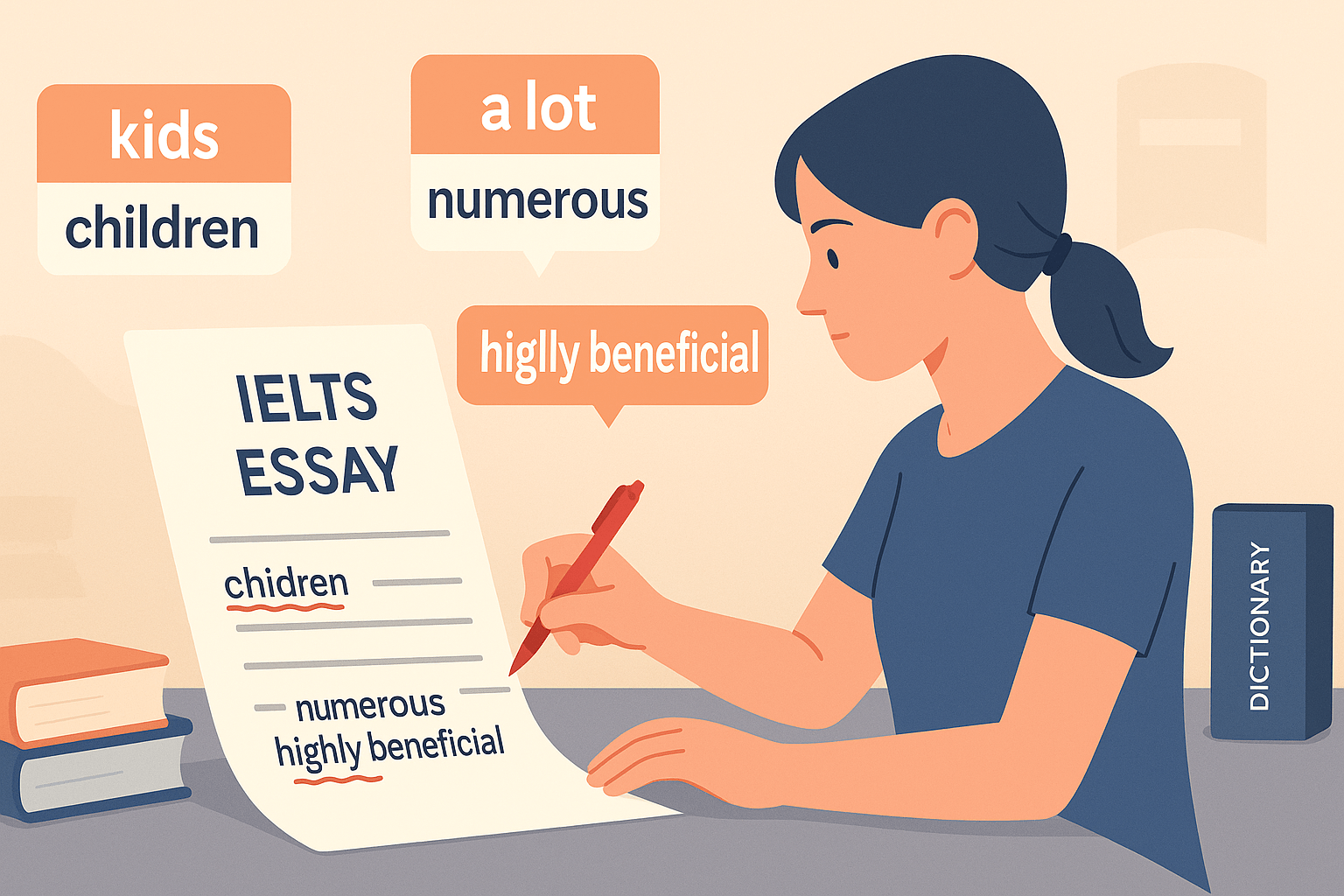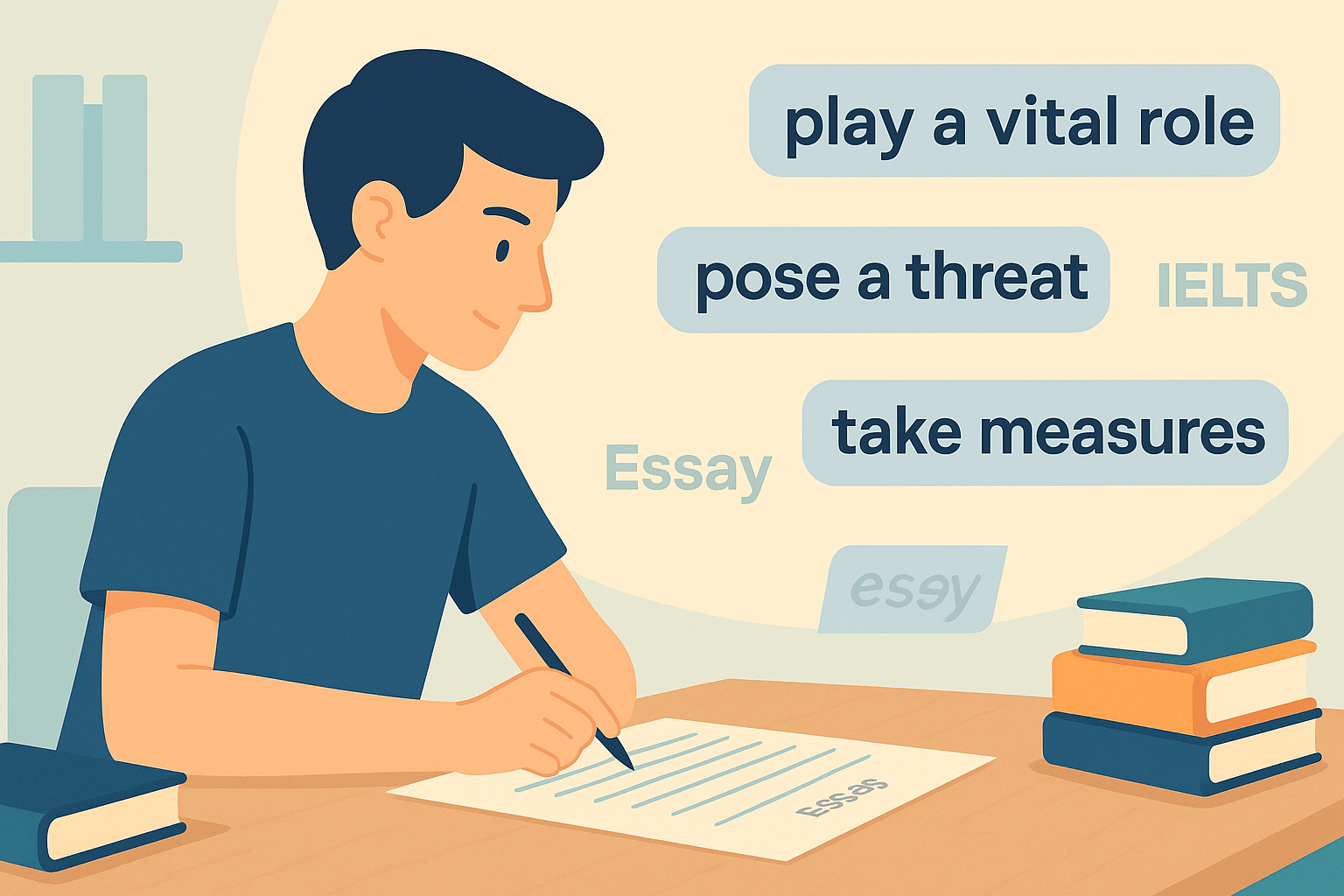When I guide IELTS students across the globe, one common issue I notice is informal word usage in Writing Task 2.
Phrases like “a lot of people,” “kids,” or “really good” may be natural in speech, but in IELTS Academic Writing, they lower your Lexical Resource score.
To reach Band 7–9, you must replace casual language with IELTS formal vocabulary.
In this guide, I’ll share:
- ✅ Examples of informal words to avoid
- ✅ Their formal, examiner-friendly replacements
- ✅ Teacher tips to make your essays clear, professional, and cohesive
For a complete vocabulary foundation, visit my IELTS Writing Task 2 Vocabulary for Band 7–9.
Why IELTS Formal Vocabulary Matters
Your IELTS Writing Task 2 score is based on four criteria:
- Task Response
- Coherence and Cohesion
- Lexical Resource (your vocabulary range)
- *Grammatical Range and Accuracy
Using formal academic vocabulary directly impacts Lexical Resource and Coherence.
Check official resources for scoring guidance:
Common Informal Words and Their IELTS Formal Vocabulary Replacements
Here’s my teacher-approved list of informal words, along with their academic alternatives for Writing Task 2.
1. Informal Words for People
- kids → children
- guys → individuals / people
- old people → elderly / senior citizens
- a lot of people → many individuals / numerous people
Example:
❌ “Kids should go to school every day.”
✅ “Children should attend school daily.”
2. Informal Words for Amount or Degree
- a lot → many / numerous / a great deal of
- really / very → extremely / highly / significantly
- a bunch of → several / multiple
Example:
❌ “A lot of traffic causes problems in cities.”
✅ “Numerous traffic congestions create significant challenges in urban areas.”
3. Informal Words for Opinion or Agreement
- I think → I believe / I am convinced that
- I guess → It could be argued that / It is likely that
- good → beneficial / advantageous / effective
- bad → harmful / detrimental / negative
Example:
❌ “I think social media is really good for communication.”
✅ “I believe social media is highly beneficial for modern communication.”
4. Informal Connectors
- and → as well as / in addition to
- but → however / nevertheless / on the other hand
- so → therefore / thus / as a result
Example:
❌ “Cars cause pollution, so the air is dirty.”
✅ “Cars contribute to air pollution; therefore, urban air quality deteriorates.”
5. Informal Words for Cause and Effect
- make → cause / lead to / result in
- get → receive / obtain / achieve
- give → provide / offer / deliver
Example:
❌ “Pollution makes people sick.”
✅ “Pollution can cause serious health problems for individuals.”
Teacher Tips for Using IELTS Formal Vocabulary
Here’s how to make your vocabulary work effectively in Writing Task 2:
1. Replace Informal Words Gradually
Don’t try to memorize hundreds of replacements in one day.
Focus on high-frequency words that appear in common IELTS essay topics first.
2. Use Collocations for a Natural Flow
Formal vocabulary works best in collocations.
Examples:
- take preventive measures
- have a significant impact
- face economic challenges
These combinations sound natural and academic to examiners.
3. Avoid Overcomplicating Vocabulary
Many students think using rare words guarantees Band 9.
❌ “The metropolis is a paradigmatic microcosm of vehicular malfeasance.”
✅ “The city suffers from serious traffic problems.”
Clarity always beats unnecessary complexity.
Sample Paragraph Using IELTS Formal Vocabulary
“Modern cities face numerous environmental challenges. Children are particularly vulnerable to air pollution, which can result in long-term respiratory issues. Therefore, governments must implement effective policies to reduce harmful emissions and promote sustainable urban development.”
Notice how the paragraph:
- Avoids casual words like kids, bad, so
- Uses formal vocabulary and collocations
- Maintains a cohesive, academic tone
Quick Practice Exercise
Rewrite this informal sentence in formal IELTS style:
“A lot of old people get sick because the air is really bad.”
Suggested Answer:
“Numerous elderly individuals suffer from illnesses due to significantly poor air quality.”
FAQ Section
Q1: Why should I avoid informal words in IELTS Writing Task 2?
Informal words lower your Lexical Resource score. Formal vocabulary makes essays professional and examiner-friendly.
Q2: What is IELTS formal vocabulary?
It is a set of academic words and collocations used to replace casual or conversational language in writing.
Q3: Can I use contractions like “don’t” or “can’t” in IELTS essays?
It’s better to avoid contractions in Task 2 to maintain a formal tone.
Conclusion
Using IELTS formal vocabulary is one of the easiest ways to boost your Task 2 score.
When you:
- Replace informal words with academic alternatives
- Use formal connectors and collocations
- Maintain a clear and cohesive writing style
… your essay will sound professional and Band 7–9 ready.
🔗 Next: Explore our IELTS Writing Task 2 Vocabulary for Band 7–9 to strengthen your writing and avoid common mistakes.




